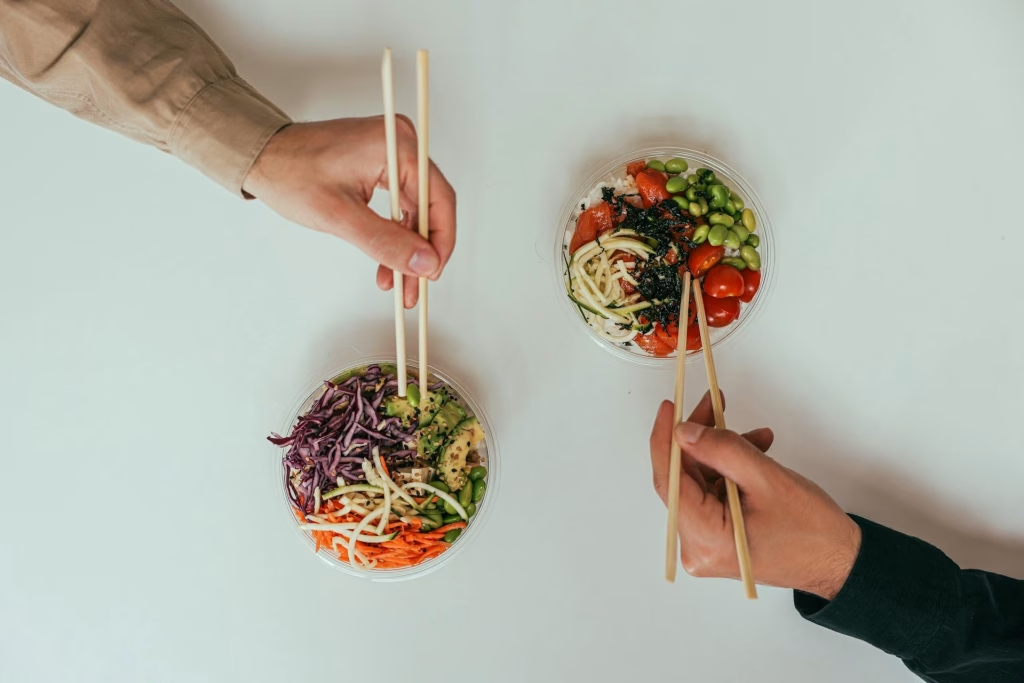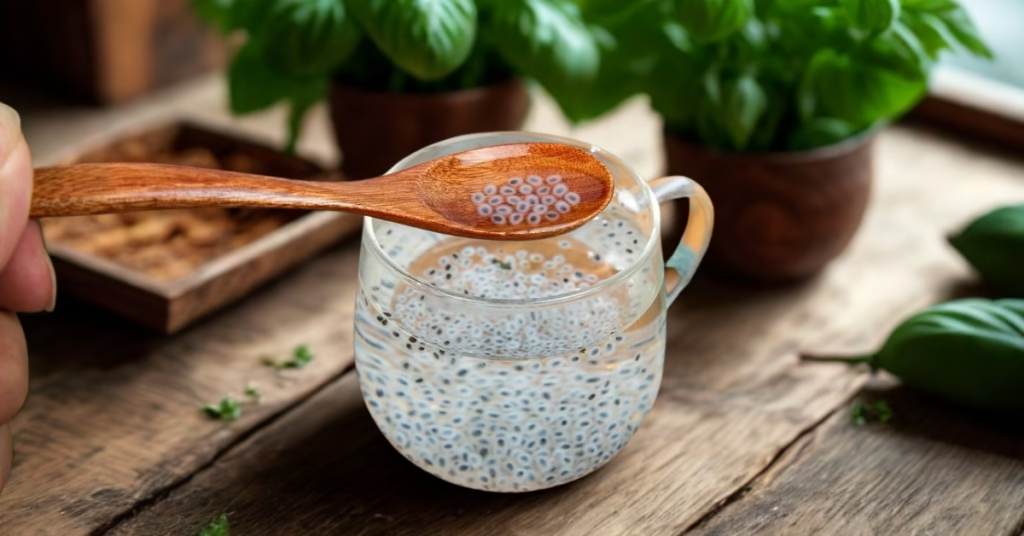A simple truth about healthy nutrition is that it is about understanding and willingness to form good habits and let go of bad ones. The best way to improve your nutrition is to slowly replace bad habits with good ones and give it some time. Good nutrition is not about extreme dieting and eliminating complete food groups ( unless you are intolerant of it due to ethical or cultural reasons). It is food that you continue to eat throughout your life.
I have prepared a list of simple but effective tips to get you started on a good nutrition journey.
1. Eat mindfully
We are all guilty of watching Netflix or scrolling on Social media while having meals. Most days, we multitask while eating, paying little attention to the speed at which we eat, bite sizes, or remembering to savour the flavours and textures. I catch myself just gobbling the food quickly, still feeling hungry after the meal, and being peckish for something sweet. And then 10 minutes later, I realised I had overdone it.
Mindful eating helps us recognize when we’re full. Eating slowly and savoring each bite allows our stomachs to signal fullness to our brains. This practice prevents overeating and enhances our appreciation of food’s flavors and textures.
As children, we naturally listen to hunger and fullness cues, but we often lose this ability as we grow older. We all can re-learn it; we should focus on eating mindfully until it becomes second nature.
Eat every meal like you are in a Michelin-star restaurant – slowly and full of wonder for flavours and textures.
2. Put your fork down in between your bites.
After every bite you take, put your fork down on the table. Only pick it up again when you are finished chewing the first bite. As simple as it might sound, this is a great way to slow down and eat your food more mindfully.
Eating with chopsticks is another way to slow down and take smaller bites. I love eating with chopsticks at home, even if I’m eating a rice dish.
To summarise this point: try to eat slower no matter what utensils you use. It takes about 20 minutes for your brain to register that your stomach is full. Eating slower gives your brain time to catch up with your stomach, reducing the likelihood of overeating and helping you feel satisfied with less food.
3. Eat till you are 80% full.
This idea originates from Japanese traditions.
The Japanese practice of eating until 80% full is called “Hara Hachi Bu” (腹八分).(1). This phrase originates from Okinawa, where people are known for living long and healthy lives. The concept encourages mindful eating by stopping before feeling full, giving the body time to recognise satiety and avoid overeating. It aligns with traditional Japanese principles of moderation and balance, promoting better digestion, weight control, and overall well-being.
Being Lithuanian, I struggle with overeating, and this is one of the bad habits I am still working hard on but getting much better with time. In Lithuanian culture, love is shown with a lot of food. I was raised with the rule that you can’t stand up from the table if your plate has any food left in it.
What works for me is to mentally see how much food I can leave on the plate before even starting to eat. Another tip is to start with the most nutrient-dense food first – so eat all the broccoli from the plate but maybe leave some potatoes on the plate.

4. Get a support system.
Trying to eat healthy when everyone around you does not care is as easy as quitting smoking when everyone is smoking around you. Try to converse with your family and explain why good nutrition and healthy eating habits are important to your health. Explaining why you are doing it will help other people to support you.
Transitioning to a mainly plant-based diet was a journey for me, and it was not easy in a society with meat engrained in the culture. I could not have done it without my partner’s support, who now mainly eats a plant-based diet.
My mom was very supportive. Every time I visit, she experiments and creates new dishes or recreates meaty classics with plant-based ingredients because she knows it is important for me.
5. Keep it simple.
Nutrition is a complex science, but it can be very simple in your daily life. If you are not a professional athlete, don’t get bogged down with numbers, especially calories, but focus on good overall nutrition and portion size. Be more mindful of where the food comes from and when to stop eating. Focus on fresh or minimally processed and nutrition-dense food, and try to cook as much as possible at home with good ingredients.
That’s it, simple

6. Enjoy your food.
Food is meant to be enjoyed. Stressing about every single bite will only make your journey harder. So, relax and savour each meal.
If your favourite food is pizza and not having it will make you miserable, then have the damn pizza, but have it once a week or once a month, not every day. It will make it so much more special if you have it sparingly.
I don’t drink alcohol almost at all, and I mostly follow a plant-based diet, but once in a while, I love having pizza and red wine with a good Netflix show.
A healthy, balanced diet is not about restricting yourself but about enjoying nutritious food most of the time and having occasional treats.
7. Hydrate
Water is vital for building muscle, digestion, and energy levels. (2)
There is a lot of information on how much water you should consume online, so I will not go into the details, but here is A Simple Rule: Monitor your thirst and urine colour. If your urine is pale yellow, you’re likely well-hydrated. If it’s darker, you may need more water.
If you are like me and struggle to consume enough water, you can also include unsweetened green, jasmine, or any other tea you like. Tea is great for hydration and contains antioxidants like catechins and flavonoids.
Having reusable water also helps. I tend to have one with a straw for easy access. If you don’t have one, I recommend investing in a good quality water bottle that will last you a lifetime.
8. Consistency is the key
Small daily or weekly changes that are easy to implement are way more effective than a “perfect diet” that lasts three days. We should think of nutrition not as a quick fix but as something we will continue following and improving throughout life. Challenge yourself to make one positive change a week and continue with it. When it becomes second nature, add the next one.
For example, start by mindfully eating one meal daily, then move to two or three. Start your morning with a glass of water. Make a habit of keeping a glass of water or your water bottle on your bedside table so you can easily reach it first thing in the morning. Then, move to adding one glass before dinner, and so on.
9. There is no one best diet
We are all very different, from age to race, health and goals, taste and food preference. We might choose certain foods for ethical or religious reasons. We like or dislike different foods. Some of us could eat mushrooms daily; some can’t even think of them. Our bodies also react to different foods differently. Some will feel healthy and light after eating broccoli or onion, and some might get uncomfortable bloating. We all have different goals—some of us want to lose weight, some want to gain muscle, some want to feel better or lower cholesterol—you get the point.
A good, nutritious diet is one that you stick to and enjoy for the rest of your life.
10. Our bodies store excess energy as fat
The excess is stored as fat when we consume more energy than our bodies need. Although protein is often used to repair and build tissues rather than for energy, the same principle applies: if we overeat—carbs, fats, or proteins—the surplus energy will eventually be stored as fat. To stay lean, we must either burn off the energy we consume or limit our intake to avoid storing excess fat.
So, at the beginning of your healthy nutrition journey, focus on portion size and fresh food instead of macros if loosing weight is your goal.
A Bonus tip:
A healthy nutrition journey starts way before your first bite. The most important is to try and plan your meals in advance and go to a supermarket prepared to buy only the food you need.
Willpower is extremely overrated, and if you have junk food in the house, you will eat it at some point.
To make it hard to order junk delete food delivery apps from your phone. Make healthy food visible and unhealthy hard to get, and you will set yourself on the right path.
To summarise Nutrition Tips:
Here are my simple nutrition tips, which everyone can implement. You might have noticed that the tips are simple. They do not require calorie or nutrient logging, restrictions, or eliminating food groups. It’s mostly about being more mindful of eating, listening to our hunger cues, and stopping eating before it’s too late.
The best nutrition tips are about enjoyment and choosing to eat real food that is good for your body in the portions your body needs.
You don’t need to implement all these tips simultaneously; you can start slowly and add them individually.
If you enjoyed this article and want to learn more about building healthy eating habits, feel free to reach out through email or social media. I’d love to help!
Please Note: This post is for informational purposes only. It’s not medical advice. It’s always best to consult a healthcare professional with health concerns. Enjoy reading!
- https://en.wikipedia.org/wiki/Hara_hachi_bun_me
- Junejo, S., Hoor, T., & Riaz, M. (2021). Appropriate Hydration Can Make a Difference. Life and Science. https://doi.org/10.37185/lns.1.1.214.
Silvija Meilunaite, PN1-NC, CSMC, is a certified nutrition and menopause coaching specialist who writes about midlife health, nutrition, and evidence-based wellness. She focuses on research-driven approaches to feeling better in your 40s and beyond, with a special interest in low-tox living and supportive daily habits.
- This author does not have any more posts.





